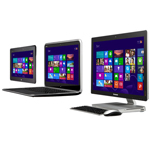
The decreasing PC market continues faster than ever, eaten by the rapid growth of mobile devices, especially by tablets, which outsell laptops and notebooks devices for the first time in 2013. But portable PCs may still be able to save the overall PC sales in the upcoming years.
The year 2011 might have been the best year for PCs when 363 million units are shipped. In 2012, the units shipped decreased to 349 million, and lesser in 2013. These numbers include shipments on both desktop and portable PCs, which is what labels notebook and laptop PCs.
Any recovery in the market will fall squarely within the portable PC sector: shipments were 201 million in 2012, and down to about 187 million in 2013.
The real growth is in portable devices in the tablet sector. Tablet shipments are growing to 58.7 percent in 2013, exceeding those of portable PCs.
Tablets are not only going to have a wider market, they are going to be smaller as well. Although tablets has surpassed smartphones, people are demanding a smaller screen for their tablets. Researches are seeing a decrease in sales of tablets in the 8"-11" size range, and a steady increase in tablets with less than 8" of screen size.
The shrinking of tablet size means that a lot less productivity will be getting done on these devices, as smaller tablets are very much consumption devices. This may explain the predicted increase of notebook sales: people will still want portability, but they also will need a platform on which to actually work.
With tablets now are not just personal use like smartphones, tablets are also entering businesses and corporations. This has given the device a fast head start despite its young age.
As for the desktop PC, the once-mighty platform is having a very fierce competition. It has been dethroned, but still widely used in many places.
Declining PC, Declining Sales of Windows 8
With the decreasing sales of PCs, Microsoft is seeing a large barrier ahead in its competition in the operating system market.
Microsoft Windows 8, the successor of Windows 7, and it's dismal performance in the marketplace is largely affected by the decline of PC usage. But is Windows 8 failing to gain traction because it isn't good, or because there's no demand for it?
Looking at the OS share marketplace. In May 2013, Windows 8 is fourth on the list with 4.27 percent market share, coming in behind Windows 7 (44.85 percent), Windows XP (37.74 percent) and Windows Vista (4.51 percent). While Windows 8 is outperforming each of the individual versions of Mac OS X, there are still far fewer Windows 8 machines in the world than any given OS X machine (7.06 percent combined).
The numbers is giving information that Windows 8 is still behind Vista, the maligned version of Windows that debuted more in November 2006.
The Crowded and Shrinking Market
A larger cause for a new operating system's failure to gain traction in the marketplace may lie in an unexpected reason: people are already happy with what they have. This satisfaction lies in two categories: the Windows software they have is stable enough to support both the hardware and software they are using.
Since fewer PCs are being sold, even fewer are being upgraded. This makes Windows 8 preload have fewer opportunities to enter the market.
Given such a situation, Windows 8 is seen to have little to no chance to become a massive release and a blockbuster product. The market is too crowded with other Windows installs that are doing their jobs well enough.
Microsoft also faces a similar problem in the mobile sector, with iOS and Android standing in the way with stronger grounds. (read: The Emerging Mobile OS War)
